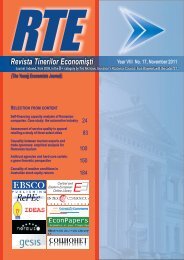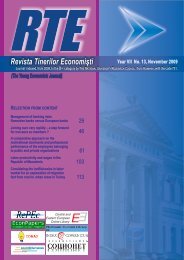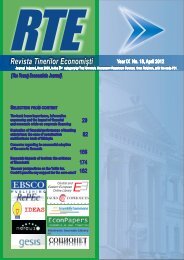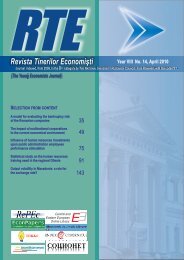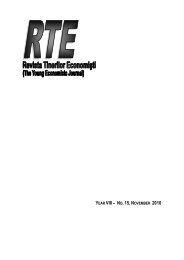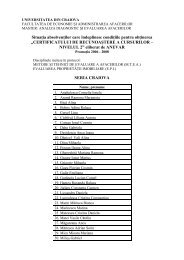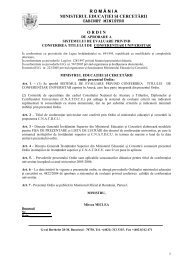Revista Tinerilor Economiºti (The Young Economists Journal)
Revista Tinerilor Economiºti (The Young Economists Journal)
Revista Tinerilor Economiºti (The Young Economists Journal)
You also want an ePaper? Increase the reach of your titles
YUMPU automatically turns print PDFs into web optimized ePapers that Google loves.
Finances - Accounting<br />
budget, provided that such debt is less than or equal to the debt that has to budget<br />
companies concerned. In this sense there is already a draft ordinance by the<br />
government. Assuming that the absorption of structural funds should be made at a level<br />
higher, we can say that this goal was not achieved as was planned so far. Analyzing the<br />
situation of the submission and approval of projects, signing contracts and funding for<br />
payment to beneficiaries on 31 January 2010, shows that Romania must do more to be<br />
able to accelerate and optimize the allocation of structural funds absorption at his<br />
disposal. <strong>The</strong> following is an empirical analysis of the situation. Us with reference to<br />
the amounts allocated to each OP, we can say that they are pretty consistent, compared<br />
to the amounts allocated under the pre-accession funds. We see a greater concentration<br />
of them in the Regional Operational Program (ROP), Sectoral Operational Programme<br />
Environment (SOP) and the Sectoral Operational Programme Transport (SOPT),<br />
programs aimed at general rehabilitation in specific areas that have been designed. <strong>The</strong>y<br />
are followed closely by Increase of Economic Competitiveness Operational Program<br />
(SOP) and Human Resources Development Operational Programme (SOP) and to a<br />
lesser extent Administrative Capacity Development Operational Programme (OP) and<br />
OP Technical Assistance. As regards the projects submitted in 31.01.2010, it is noted<br />
that the number was higher for SOP (5415) and SOP (5273), and ROP (3415) and the<br />
other operational programs their number was much lower. In the OP were a total of 931<br />
submitted projects at the end of January 2010, similar to December for the year 2009,<br />
while in the SOP were submitted a number of 204 projects registered to date<br />
31/01/2010, an increase of 63 in number, from 31.12.2009 when only 141 projects were<br />
submitted, but far below expectations, given the importance that is OP. Also, if SOP<br />
was submitted a maximum of only 41 projects, 31.01.2010, maintaining the same level<br />
as those observed on 31.12.2009. This shows that both authorities together with other<br />
'actors' (businesses, NGOs, trade unions, employers, SMEs, etc.) Belonging to the<br />
target group through the OPs, showed no interest in to submit applications for funding<br />
these programs operational, although the amounts allocated to them were quite<br />
significant.<br />
4.1 Critical<br />
Analyzing the situation of approved projects, we can see that the number was<br />
much lower than that of projects submitted. This shows that in Romania there are still<br />
enough people who have expertise in this area. For example, if the ROP in 3415 a<br />
number of projects submitted, only 736 were approved, rejected 1013 and the<br />
remainder of 1666 is under evaluation. Also, in terms of SOP, in 5415 a number of<br />
projects submitted, 2216 were rejected, 1265 were approved, and 1921 is under<br />
evaluation. Thus a total of 15,312 projects submitted, only 3910 were approved, and a<br />
number of 6772 have already been rejected. It follows that nearly half (44%) of the<br />
projects submitted were declared ineligible, but their numbers can grow, given the fact<br />
that 4617 projects are under evaluation. However, their total value, expressed in lei is<br />
proportional to the number of projects to be approved and implemented<br />
Of course, this development is disproportionate due to some inconsistencies in<br />
the structural funds management capacity and internal procedures for approving such<br />
projects. <strong>The</strong>re have also been proposed and implemented a series of changes in<br />
national legislation, which was subject to approval from the European Commission,<br />
amendments aimed primarily to reduce the period of evaluation of projects developed<br />
in Romania, for which the European funding of more than 80 days to about 30 days.<br />
53



